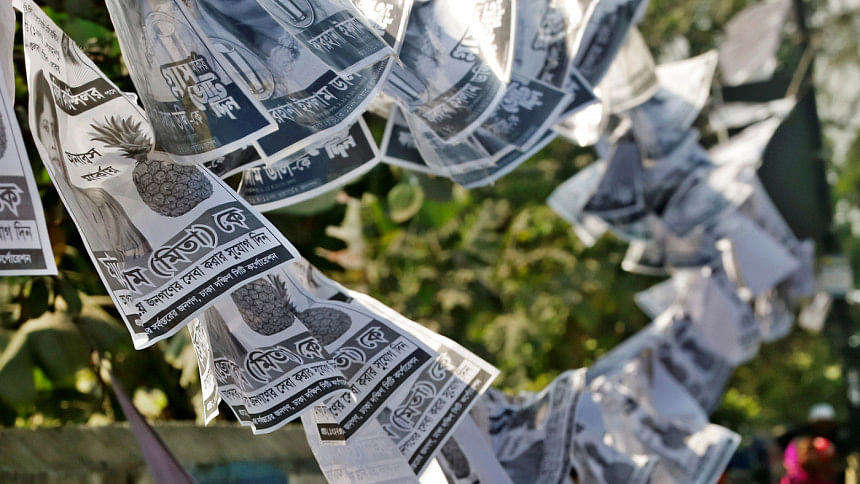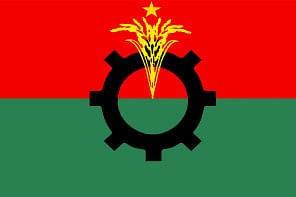Promises, promises and more promises

The Dhaka city mayoral elections may be local but they nevertheless evince keen interest at the national level because of the symbolic value that the office of the mayors carry with them. It is no different this time. The DCC elections have once again highlighted some of the systemic shortcomings that we encounter during all elections, particularly the role and performance of the Election Commission (EC), and the plethora of promises the candidates make.
For any institution, a good start is half the work done. Was it so for the EC? It seems that nobody in the EC bothered to look at the calendar which the administration provides to all government and state offices containing a list of important days and holidays, before fixing the polling date for the DCC elections. Any alert person would have realised the furor it would cause to have the DCC elections date clash with an important Hindu religious festival. This had to be changed, but not before the matter was taken to court, which consequently forced a change in the date of opening of the Ekushey Boi Mela. These may be apparently trivial matters, but nonetheless reflect a lack of attention to detail that is not expected from such an important institution.
Another prickly issue for the EC is the debate surrounding the use of the Electronic Voting Machine (EVM). One feels that the EVM need not have been introduced. There are reservations about its use, and even in countries with democratic systems firmly rooted in tradition and values, the machine has not found currency. Although it is not banned in many European countries, they are not in use. And in a country where the system is defiled by muscle power and institutional collusion with the incumbent party, even the advantages of EVM can be compromised.
There was and continues to be flouting of electoral rules by both parties, which were not being dealt with promptly or appropriately. Ruling party lawmakers have been seen participating in electoral campaigns on behalf of their candidates. Such violations were seen off with merely a warning of "stern action" for future violations. However, one is waiting to see what action will be taken by the executive magistrates on the instructions of the EC on the complaint by the BNP candidate for DNCC against his AL rival, launched on January 20. Nevertheless, the EC should be complimented for not wilting to the demand of the ruling party that its MPs and ministers be allowed to canvass for their candidates. MPs often forget, while making such puerile request, that members of parliament, particularly those that represent the constituencies of Dhaka city, represent all the voters and not just the AL voters in the parliament. Rooting for their candidates would strip them of that credential.
Of course, politicians are never short of promises to the people before an election. The tall promises fall very short of fulfillment. The promise of milk and honey leads to little honey and even less the milk. Very few are fulfilled, either because the commitments are outlandish or what was said was not meant but made merely to garner votes.
The Tk 10 for every kg of rice that a party promised to the people before the 2009 elections never materialised, and very frankly, no one expected to buy rice at that price in the first place. Not even someone with an Aladdin's lamp could provide rice at that price 10 years ago. Neither did the commitment to the people to give employment to at least one in every family materialise, but to be fair, much has been done in creating employment in the country since 2010. But why promise what cannot be delivered? This is because our politicians exploit the short term memory of the voters, and often the past promises are forgotten. And how often do our candidates organise the likes of town hall meetings that we see in other democratic countries and subject themselves to questioning by their voters? The sad reality is that most of them forget the constituency and the commitments as soon as the voters are done casting their vote.
The commitments made this time by the four mayoral candidates sound good too, although some are highly technical. For example, the idea of a digital municipality, which stems from the idea, one presumes, of a digital city, sounds promising, but very few of the voters understand what it really is. Those who do, ask the question, is it possible for a city mayor alone to implement such an ambitious goal without the participation and commitment of the many others necessary for this?
The idea of a "metropolitan government" would resonate with most people, but has not found favour with the government despite the fact that successive mayors have been calling for the establishment a metropolitan government to make Dhaka city more governable and life for the people more bearable. Merely splitting the metropolis can ensure neither.
Admittedly, many of the things that mayors promise but fail to implement are not entirely because of their inability to do so but because there are a dozen other state service providers on whom the city corporations are dependent upon to deliver these promises. Unless they are brought under one roof, the people in the capital will continue to live in the dreadful condition that they are presently living in. We do not ask for the moon, and do not want the candidates to promise us the moon either. We ask for good roads, free footpaths, a good sewerage and water system and common civic amenities. And that is what the candidates must focus on.
Shahedul Anam Khan is former Associate Editor,
The Daily Star.

 For all latest news, follow The Daily Star's Google News channel.
For all latest news, follow The Daily Star's Google News channel. 



Comments